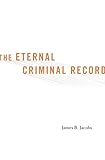The Eternal Criminal Record / James B. Jacobs.
Material type: TextPublisher: Cambridge, MA : Harvard University Press, [2015]Copyright date: ©2015Description: 1 online resource (320 p.)Content type:
TextPublisher: Cambridge, MA : Harvard University Press, [2015]Copyright date: ©2015Description: 1 online resource (320 p.)Content type: - 9780674368262
- 9780674735842
- 345.73/0123 23
- KF9751 .J33 2015eb
- online - DeGruyter
- Issued also in print.
| Item type | Current library | Call number | URL | Status | Notes | Barcode | |
|---|---|---|---|---|---|---|---|
 eBook
eBook
|
Biblioteca "Angelicum" Pont. Univ. S.Tommaso d'Aquino Nuvola online | online - DeGruyter (Browse shelf(Opens below)) | Online access | Not for loan (Accesso limitato) | Accesso per gli utenti autorizzati / Access for authorized users | (dgr)9780674735842 |
Frontmatter -- Contents -- Preface -- 1. Introduction -- PART I: The Production and Dissemination of Criminal Records -- 2. Intelligence and Investigative Databases -- 3. Linking Bodies to Criminal Histories -- 4. Court Records -- 5. Privatizing Criminal Records -- PART II: Key Policy Issues -- 6. Whether to Create a Criminal Record -- 7. Sealing, Purging, and Amending Conviction Rec ords -- 8. Erroneous Records Problems -- PART III: U.S. Criminal Record Exceptionalism -- 9. Transparency of Criminal Convictions -- 10. Public Access to Arrestee Information -- 11. Publicly Accessible Criminal Records and Punishment Theory -- PART IV: Direct and Collateral Consequences of a Criminal Record -- 12. Criminal Justice Consequences of a Criminal Record -- 13. Second- Class Citizens by Law -- 14. Employment Discrimination Based on a Criminal Record -- 15. Conclusion -- Appendix. Notes. Index -- Appendix: Supreme Court Cases Dealing with Criminal Records -- Notes -- Index
restricted access online access with authorization star
http://purl.org/coar/access_right/c_16ec
For over sixty million Americans, possessing a criminal record overshadows everything else about their public identity. A rap sheet, or even a court appearance or background report that reveals a run-in with the law, can have fateful consequences for a person's interactions with just about everyone else. The Eternal Criminal Record makes transparent a pervasive system of police databases and identity screening that has become a routine feature of American life. The United States is unique in making criminal information easy to obtain by employers, landlords, neighbors, even cyberstalkers. Its nationally integrated rap-sheet system is second to none as an effective law enforcement tool, but it has also facilitated the transfer of ever more sensitive information into the public domain. While there are good reasons for a person's criminal past to be public knowledge, records of arrests that fail to result in convictions are of questionable benefit. Simply by placing someone under arrest, a police officer has the power to tag a person with a legal history that effectively incriminates him or her for life. In James Jacobs's view, law-abiding citizens have a right to know when individuals in their community or workplace represent a potential threat. But convicted persons have rights, too. Jacobs closely examines the problems created by erroneous record keeping, critiques the way the records of individuals who go years without a new conviction are expunged, and proposes strategies for eliminating discrimination based on criminal history, such as certifying the records of those who have demonstrated their rehabilitation.
Issued also in print.
Mode of access: Internet via World Wide Web.
In English.
Description based on online resource; title from PDF title page (publisher's Web site, viewed 30. Aug 2021)


